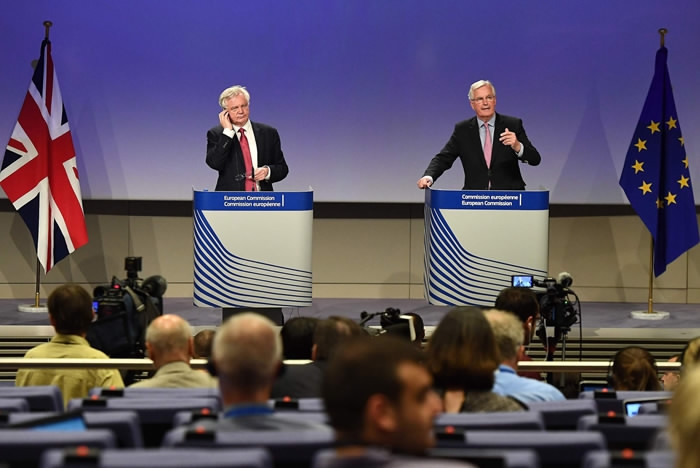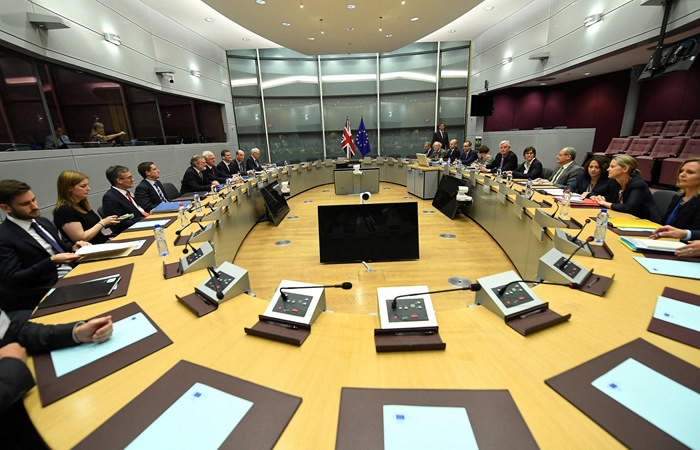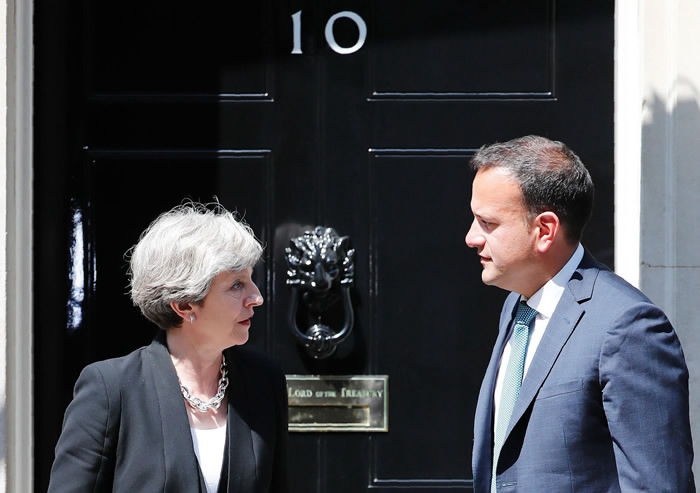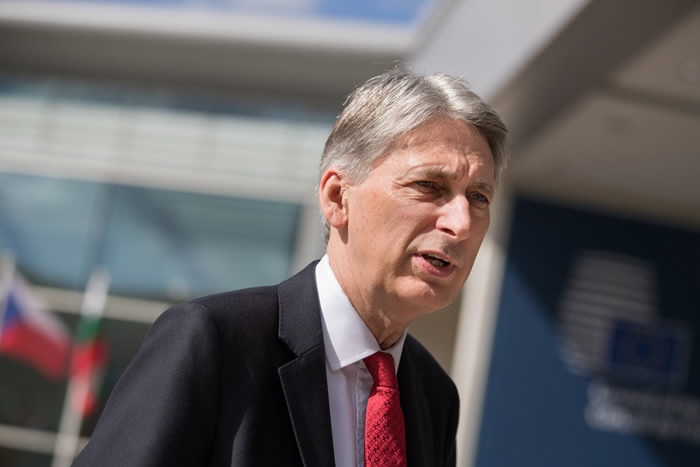Britain accepted the European Union's timetable for Brexit talks on Monday, in an apparent climbdown on the first day of formal negotiations in Brussels.
EU chief negotiator Michel Barnier said the talks with Brexit Secretary David Davis, which are starting a full year after Britain's seismic vote to leave, had started "on the right foot."
In carefully choreographed talks that even saw the two men exchange mountaineering gifts, they agreed to discuss divorce issues before negotiations on a future trade deal can start. These include the thorny issues of Britain's estimated 100-billion-euro (112 billion US dollar) exit bill, the rights of EU citizens living in Britain, and the fate of the border in Northern Ireland.

Brexit Secretary David Davis (L) and EU chief negotiator Michel Barnier address a press conference at the end of the first day of Brexit negotiations at the European Commission in Brussels, Belgium, June 19, 2017. /VCG Photo
"This first session was useful, we start off on the right foot as the clock is ticking," Barnier told a joint press conference with Davis.
"Today we agreed on dates, we agreed on organization and we agreed on priorities for negotiations," he said after the talks at the European Commission in Brussels.
The two sides agreed to hold four further monthly rounds of talks, with the next on July 17, on the key issues of Britain's divorce from the bloc.
But the agreement appeared at odds with British Prime Minister Theresa May's earlier insistence that the divorce and the future relationship should be discussed in parallel.
EU rules out 'concessions'
Frenchman Barnier struck a firm tone as he said the timetable for Britain's divorce after four troubled decades of membership made sense.
"If you ask me are we going to make concessions, I must tell you that it is the UK that is leaving the EU, the single market, the customs union and not the other way around," the former European commissioner and French foreign minister said.

The first day of Brexit talks at the European Commission in Brussels, Belgium, June 19, 2017. /VCG Photo
Davis said the talks were off to a "promising start" and denied that Britain had caved in on the sequencing of the talks.
"That position hasn't changed, it's the same as it was before," said Davis, a tough-talking figure in the "Leave" campaign in last year's Brexit referendum.
He also confirmed that Britain would opt for a "hard Brexit" that involves quitting the EU's single market and customs union, rejecting suggestions that after a poor election performance by May the line might be softened.
"We need back control of our borders, we will leave the single market and the customs union." he said.
'A fair deal is far better than no deal'
Worried by immigration and loss of sovereignty, Britons voted last June to become the first nation ever to leave the 28-nation EU. The vote came as a profound shock to Brussels against a backdrop of rising anti-EU sentiment, with many – including now US President Donald Trump – predicting the bloc's eventual break-up.
But May's mandate for a hard Brexit has since eroded after her Conservative party lost its parliamentary majority in the June 8 general election.

Britain's Prime Minister Theresa May (L) greets Ireland's Taoiseach (Prime Minister) Leo Varadkar outside 10 Downing Street in London, Britain, June 19, 2017. /VCG Photo
Britain's political instability has caused concerns in European capitals hoping to get the negotiations over with quickly and cleanly, as has May's oft-repeated threat to walk away from the talks without a deal if necessary.
Barnier however said that "a fair deal is possible and is far better than no deal – that is what I said to David today. That is why we will work all the time with the UK, and never against the UK."
Brexit risks to UK economy in focus
The two men in charge of Britain's economy are expected to spell out on Tuesday how they plan to prevent a further hit to its already weakened growth prospects following the launch of the country's historic Brexit talks.
A day after British and EU negotiators met for the first time in Brussels, UK Chancellor of the Exchequer Philip Hammond and Bank of England Governor Mark Carney will deliver speeches they postponed last week because of a deadly fire in a London housing block.

UK Chancellor of the Exchequer Philip Hammond. /VCG Photo
Britain went from being one of the fastest-growing economies among the Group of Seven nations in 2016 to its slowest in early 2017 as the fall in the value of the pound after the Brexit referendum pushed up inflation and hit consumer spending.
The economy will expand by 1.6 percent this year before slowing to 1.4 percent in 2018, according to upgraded forecasts from the Confederation of British Industry.
While the drag from inflation on the world's fifth-biggest economy is likely to fade next year, Hammond and Carney have both stressed the importance of avoiding a so-called "hard Brexit" in 2019.
(Source: AFP, Reuters)
Related stories:
UK, EU begin divorce talks amid British uncertainties
UK Brexit minister: 'No doubt' over Britain leaving the EU
Former chancellor calls May 'dead woman walking' amid Tory civil war









